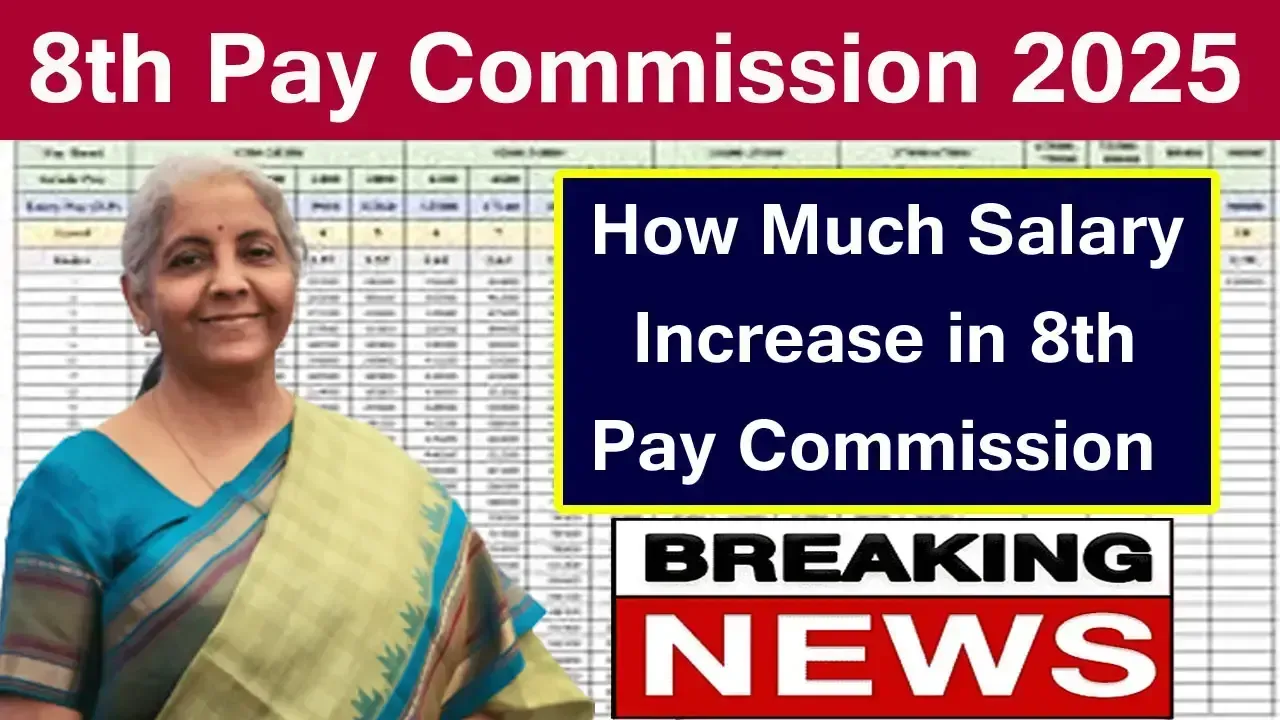How Much Salary Increase in 8th Pay Commission
8th Pay Commission News, 8th Pay Commission Salray Hike, How much salary increase in 8th Pay Commission - In a major development, the central government has officially approved the formation of the 8th Pay Commission (8th CPC). This decision marks a crucial step towards revising the salaries and pensions of central government employees and retirees across the country.
With the commission now approved, expectations are high regarding the potential changes in pay structure, allowances, and retirement benefits. Employees and pensioners alike are eagerly awaiting further updates, as the implementation of the new pay commission is likely to bring significant financial improvements and policy reforms.

8th Pay Commission to Be Constituted Soon
The formation of the 8th Pay Commission is expected to take place shortly, with its constitution likely in April 2025, according to a report by The Times of India. In a recent interview, Manoj Goel, Expenditure Secretary at the Finance Ministry, confirmed that the process for establishing the commission is already in motion.
Currently, a draft proposal has been circulated among key departments, including the Ministry of Defence, Ministry of Home Affairs, and the Department of Personnel and Training, to seek their feedback. Once their suggestions are reviewed, the Terms of Reference (ToR) will be finalized. Following this, the proposal will be sent for cabinet approval.
Key Highlights
- The 8th Pay Commission is expected to be set up in April 2025.
- The fitment factor may increase from 2.57 to 2.86, leading to a potential 25–30% hike in salaries.
- The minimum basic salary could go up to ₹51,480.
- The minimum pension may increase to ₹25,740.
- The new pay structure is likely to be implemented from FY 2026–27.
Expected Salary and Pension Hike Under the 8th Pay Commission
The 8th Central Pay Commission (CPC) is expected to bring significant changes to the salary and pension structure for central government employees and pensioners. While official figures are yet to be released, early reports suggest that a revised fitment factor will play a crucial role in determining the extent of the hike.
Impact on Salaries
- Under the 7th CPC, the minimum basic salary increased from ₹7,000 to ₹18,000.
- For the upcoming 8th CPC, central employees are pushing for a higher fitment factor of 2.86. If accepted, this could raise the minimum salary to ₹51,480, resulting in a substantial increase in take-home pay.
Impact on Pensions
- The current minimum pension under the 7th Pay Commission stands at ₹9,000.
- With the anticipated implementation of the 8th CPC, this figure could go up to ₹25,740, providing improved financial stability and support to retired employees.
8th Pay Commission Implementation Timeline
The 8th Pay Commission is likely to be constituted by April 2025. Once formed, the commission will take time to draft and submit its recommendations. After thorough government review and cabinet approval, the revised salary and pension structures will be rolled out.
According to current projections:
- No financial impact is expected in FY 2025–26.
- The revised pay structure is anticipated to be implemented starting April 2026, i.e., in the financial year 2026–27.
How Often Are Pay Commissions Formed?
- The Central Pay Commission is typically constituted every 10 years to review the pay structure in light of inflation, economic shifts, and evolving employment needs.
- The 7th CPC was implemented in 2016 and is expected to remain in force until 2026, aligning with the expected formation and rollout of the 8th CPC.
Frequently Asked Questions (FAQs)
1. When will the 8th Pay Commission be implemented?
The 8th Pay Commission is expected to be constituted in April 2025, and after reviewing its recommendations, the government is likely to implement the revised pay structure from April 2026 (FY 2026–27).
2. How much salary hike is expected under the 8th Pay Commission?
Employees can expect a 25–30% increase in their salaries, depending on the final fitment factor, which is proposed to increase from 2.57 to 2.86. If approved, the minimum basic salary could go up from ₹18,000 to around ₹51,480.
3. What is the expected increase in pension under the 8th CPC?
The minimum pension under the 8th CPC is expected to rise from the current ₹9,000 to around ₹25,740, offering better financial security to retired central government employees.
4. Has the government officially approved the 8th Pay Commission?
Yes, the central government has officially approved the formation of the 8th Pay Commission. The process to finalize its Terms of Reference (ToR) is already underway, and feedback is being collected from key ministries.
5. How often is a Pay Commission formed in India?
A Central Pay Commission is typically set up every 10 years. The last (7th) Pay Commission was implemented in 2016, and its recommendations are expected to remain valid until 2026.
Conclusion - How much salary increase in 8th Pay Commission
The anticipated rollout of the 8th Pay Commission represents a major financial reform for government employees and pensioners. While the final figures will be confirmed only after detailed assessments and government approval, the proposed hikes suggest a strong step toward enhanced economic well-being for lakhs of families relying on central pay structures.


